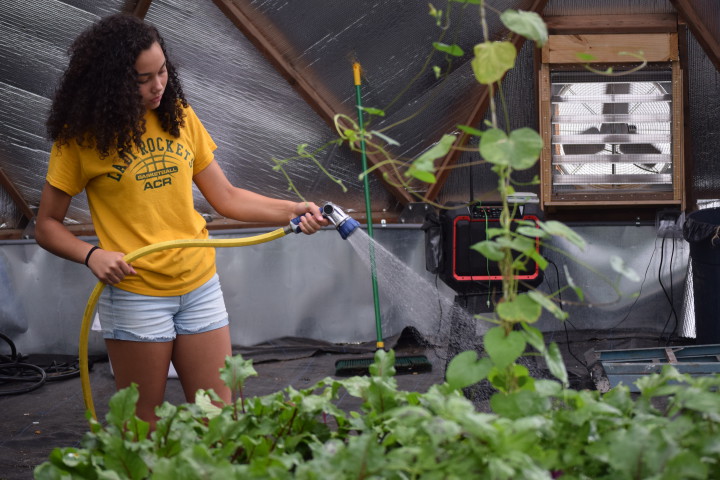It’s a sunny day on the edge of autumn, and the rolling green fields of Eliada’s Leicester campus give no hint of its proximity to the noisy gridlock of Patton Avenue. Beyond the grass, stretching to the horizon, 12 acres of 11-foot-tall, tasseling sweet corn stalks sway and ripple in the breeze.
“This is the biggest corn I’ve ever seen here,” remarks Eliada stewardship manager Chris Rainwater, gently pulling back the lime-colored husk on a nearby ear to reveal small, white kernels, still developing. His statement conveys more than pride — there’s also relief and hope for the future in those words.
This fall marks the 10th anniversary of the Eliada Corn Maze, the 115-year-old nonprofit child services agency’s largest fundraiser. Over the course of six weeks each fall, the event manages to net around $100,000 annually — close to $1 million since its inception — to support the residential mental health treatment, foster care, day care and career readiness programming Eliada provides to more than 600 infants, children and young adults each year.
But this year’s maze signifies more than just a birthday milestone for a community event that has become a fall tradition for many Western North Carolina families. The 2018 Corn Maze is helping usher in a sea change for Eliada — one that looks toward growing a more sustainable future for the organization by taking a page from its agrarian past.
Farm beginnings
Maze visitors this year will still find the corn cannons with their giant pumpkin-people targets, hayrides, tube slides and other signature activities that are surely starting to become part of Asheville’s collective autumn memory. What they won’t find is the usual field of GMO, chemical-sprayed dent corn.
The 2018 field is planted with an heirloom, non-GMO variety of white sweet corn called Trucker’s Favorite. And it’s being cultivated using no-spray, organic practices. For the first year in the history of the maze, Eliada’s children — and visitors — will be able to eat the corn grown in the field.
“Previously, it was dent corn, because it’s easier to grow and it was hardier,” says Rainwater. That corn was also GMO, he adds, and it was sprayed with Roundup to control weeds. “I’m so thankful that the corn looks this good, because the pH levels are really off this year [from past chemical use]; that it’s been able to hit this height is really amazing.”

Former Eliada CEO Mark Upright introduced the maze concept to the 320-acre campus after a trip to the western United States gave him a glimpse of farmers using seasonal cornfield mazes to bolster their incomes. “He started it as a fundraiser, and it worked beautifully,” says director of development Tami Ruckman.
“[The maze] really was a throwback to farming; Eliada has always used our land,” says Ruckman. “It’s our greatest asset besides the children, and we want to use it and be good stewards of it.”
The property already had an agricultural history when Eliada founder Dr. Lucius Compton bought the original 5 acres near Slippey Mountain with a run-down cabin and barn in 1903 to establish an orphanage, says Ruckman, who maintains historical records for the organization. Eliada was a working farm until around 1977, with a dairy operation, a large flock of chickens and fields growing corn, potatoes, cabbage, carrots, beans and “anything that you would need to feed 150 children,” she says.
Helping work the land and care for the animals was part of daily life for residents. “The boys tended the farm — there was a farm manager — and the girls harvested, canned and cooked,” says Ruckman. “They learned to can; they learned to pickle, freeze and every method of preservation.”
Every day, the boys milked the Guernsey cows, which, Ruckman believes, came from the Biltmore Estate’s Guernsey herd. Any milk that wasn’t used for the children was packaged in quart glass milk bottles imprinted with the Eliada Farms brand and delivered to local homes. Any extra was sold to Biltmore for its milk distribution business.
Most of the eggs produced on the farm were used on campus, and any extras were likewise sold to the community. All produce from the fields, says Ruckman, was used to feed the children, and in this way, the orphanage was able to support itself.
Milk production, and ultimately all farming practices, ceased in the late 1970s when it became easier to purchase food from commercial suppliers. By that point, says Ruckman, the culture had shifted, and most of the staff no longer knew how to operate a farm.
Repeating history
The revolutionary changes to the maze are part of an overall shift in direction for Eliada. In the last few months, the organization has edged away from a dependence on government funding and toward a reclamation of its history as a self-sustaining, agriculture-based entity.
Last winter, Eliada unveiled a new geodesic Grow Dome on its campus that is used both as a STEM classroom and a source of fresh food for the children’s meals. Local farming, aquaponics and hydroponics expert Brook Sheffield of L.O.T.U.S. Urban Farm & Garden Supply helped lead the project as a consultant then joined the Eliada staff as farm manager six months ago.
On a recent visit to the dome, Sheffield led a small class of teenage students as they checked on tilapia in the blue aquaponics tank and tended to adjoining rows of tubs containing jade-green basil, mint and other herbs. Across the aisle, fat cucumbers and tomatoes dangled from tall trellises above their hydroponic growing systems. Peaceful music played in the background, and the students were so intent on the plants and fish that they seemed to barely notice the visitors.
“The goal is to pretty much feed our students,” says Rainwater. “Right now we’re producing about 20 pounds of tomatoes a week.”
Toward that dream of self-sufficiency, Eliada has plans to expand food cultivation far beyond the confines of the Grow Dome. “We built it, and they came,” says chief business development officer Frank Taylor of the dome. “It’s nice, it’s an attraction and it brings a lot of people on campus. It’s interesting in its weirdness, and people are fairly impressed that we’re that progressive, but now we’re going to the next step.”
A sustainable direction
Taylor has been a driving force behind the revival of Eliada’s farming focus. Formerly the owner and president of Westall Chandley and president and CEO of Genova Diagnostics, he took an immediate interest in Eliada’s history when he joined the organization in 2016. Getting back to those farming roots, he concluded, was the key to the nonprofit’s long-term sustainability.
A year ago, working with Sheffield as a consultant, Taylor started growing hydroponic lettuce in the basement of the Compton Cottage, the historic home of Eliada’s founder. “We learned about hydroponics, and we did very well,” he says. “So we decided that we needed to take the next step, and that was to build our Grow Dome, and that became the centerpiece of what we’re doing.”
Last year, after the Corn Maze closed for the season, under Sheffield’s direction, Eliada purchased 16 pigs, which were kept in a movable, solar-powered fence within the maze. Feeding on the corn and scraps from the campus kitchen, the pigs turned up and fertilized the soil, simultaneously making way for the new, no-spray cornfield and fattening themselves up to be turned into pork that was later sold to the community.

The pork project was successful, but it’s taking a break this cycle as other large undertakings develop on the property this fall, says Taylor.
Between 5 and 8 acres near the Corn Maze that currently serve as an underused golf range are slated to become farmland within the next six to 12 months. The parcel will be divided into multiple small plots to be cultivated in the relatively small-scale, market-garden style popularized by Canadian farmer Jean-Martin Fortier.
This method of agriculture calls for hand tools and walk-behind tractors rather than large-scale equipment. “In this way, we can actually take the children and begin to have them involved in farming,” says Taylor.
With some of Eliada’s residential students coming from metropolitan areas like Charlotte and Raleigh, “a lot of the kids have never seen a tomato plant,” say Rainwater. “They come from the inner city, so it’s great exposure for the kids on campus.”
But another objective, in addition to eventually growing enough food to sustain Eliada’s residents, is to create a revenue stream. Using connections to Asheville restaurants nurtured through the Eliada Students Training for Advancement workforce development internship program, Taylor aims to sell Eliada Farms produce to local chefs.
This idea got a test run during Eliada Farms Week in August, a fundraiser in which veggies and herbs from the Grow Dome were used as ingredients in special dishes and cocktails at local restaurants and bars. “We’re going to grow in a targeted manner,” Taylor says. “So, you’ll see a lot of root vegetables, different kinds of lettuces, tomatoes, then you’ll see things that are more exotic, specialty items.”
Ruckman adds that Eliada is also in the process of planting an orchard of around 100 fruit trees, including heirloom varieties of peaches, pears and apples. As the trees mature, beehives will be added as well as chickens, she says, which will be kept “in a chicken bus, which will move from place to place, fertilizing the ground as it goes.”
Taylor says produce raised at the farm — as well as, eventually, Eliada Farms-brand value-added products such as pepper sauces and pestos made in Eliada’s commercial kitchen — will be available to the general public through a farm stand that will be the first stage of a multiphase plan for the property.
The design, which is still being developed, calls for a deck with a seating area where guests can view the maze and farm plots while sipping coffee or apple cider. “It’ll be a nice place to hang out,” he says. “The more community I drive to this campus, the better off this campus is.”
He hopes to break ground on the farm stand within the next six months. But he hints at another phase of the plan that he’s not yet ready to discuss in detail — a sort of “cross between the [N.C.] Arboretum, the [WNC] Nature Center and Disneyland” designed for children.
“The farm and these projects surrounding the farm are the kinds of things that will make us self-sustaining and will allow us to do some things with our programs and our children that will raise the level of care and allow us to do things that we can’t do today because we’re money-strapped,” he says, noting that he has been working on garnering broad community support for helping get these initiatives off the ground.
Stepping away
Interestingly, even with its new homegrown direction, Eliada couldn’t immediately move away from the processed institutional foods that it had been serving its children for years. A grant from the Department of Public Instruction to supplement its food-program funding required extremely detailed tracking of calories, proteins and other nutrients — metrics that are only available when using prepackaged foods.
“Making homemade pesto with grilled chicken and salad sounds like a very healthy meal, but it doesn’t fit within the program because you don’t easily have the nutritional breakdowns on scratch-made foods,” says Rainwater.
“It is our feeling that the grant uses outdated nutrition information and guidelines and is cumbersome to administer, and so we chose to not reapply,” says Ruckman, noting Eliada still has a federal Child and Adult Care Food Program grant, which is implemented by most children’s homes, child care centers and centers for adults with disabilities.
“This decision around the DPI was made easier by the fact that we have cost savings growing our own vegetables while tying into our long-term goal of sustainability,” Rainwater explains. “We’re serving our students quality organic, delicious and nutritious foods while giving them the opportunity for STEM education in our Grow Dome.”
And, so far, the choice has proven to be a winner with the students — even with children and teens who had previously chosen to stay in their cottages during meals or selected alternative options such as peanut-butter-and-jelly or grilled cheese sandwiches.
“It was an amazing transformation for us when our kitchen started making scratch-made meals,” he says. “The number of PB&Js we made plummeted, our students were eating homemade foods and loving it. Students were eating their vegetables and even asking for seconds. They were excited for salads because they had a hand in growing the tomatoes, salad greens and cucumbers.”
Growing potential
With all the other changes happening at Eliada this year, the new-and-improved Corn Maze stands out to Taylor as a landmark achievement. “It’s probably one of the proudest things that’s happening for me here,” he says.
Before Sheffield came aboard as farm manager, the maze had, incredibly, been entirely planted and maintained each year by Eliada’s maintenance staff with guidance and help from local farmers, including Bud Sales of Sales Farm and Greenhouse in Fairview.
But this year’s maze has been Taylor’s and Sheffield’s special project. “We disced the earth repeatedly,” he says. “We had help from the agricultural extension office, who came out and talked to us about weed control and what we could expect, what to watch out for. We planted in a brand-new way in terms of how close together we placed the corn.”
And then they waited. And, so far, things look much better than Taylor could have anticipated. Although without using pesticides insects could still prove to be a problem, this year’s crop looks as healthy as any he’s seen at Eliada. “It’s 11, 12 feet tall; beautiful, sweet corn,” he says. “We planted 350,000 seeds — we could have a million ears of corn.”
As in previous years, the maze design, with its theme of “10 Years of Family Fun,” was cut by an Idaho-based, family-owned company called MazePlay, which creates hundreds of field mazes each year around the country with a GPS-guided tractor. This year’s trail is total of 3.7 miles long, comprising three separate paths of differing lengths and complexity.
Some of the sweet corn grown this year in the maze will be served grilled on the cob at the Corn Maze concession stand, which will be run for the first time by Foothills Meats, according to Rainwater. The rest of it will be frozen or otherwise preserved to be served to the children.
In honor of the 10th anniversary, tickets will be offered at a lower price than in years past — $10 for all ages, free for children ages 3 and younger. And yet another first for 2018 is the addition of beer and hard cider on Friday nights and weekends — a change that was not taken lightly by this organization that was founded on Christian values and serves many children whose lives have been negatively affected by substance abuse.
“It was a long, hard process to figure out if this would be a fit for us,” says Rainwater. “But it feels like a good fit for Asheville; if we were in another community, maybe not. It’s one more way that we can get people on campus and hopefully get to see a new demographic at the Corn Maze.”
Each weekend of the maze, breweries, including Catawba Brewing Co., Lagunitas, Oskar Blues Brewing, French Broad River Brewery, Burial Beer Co. and Pisgah Brewing Co., are donating their products for Eliada to sell at the event. Rainwater says Eliada is also working to expand outreach regarding other maze offerings, which include field trips and corporate nights for businesses.
It’s a bit early in the game to have an idea of how these huge shifts will impact Eliada and the hundreds of infants, children and young adults it serves each year. But Taylor and other staff members seem convinced things are moving in the best possible direction.
“We’re changing things not for the sake of change, but because we need to,” says Taylor. “We need to be more self-sufficient; we need to be sustainable — in today’s world, we need that desperately.”
WHAT: Eliada Corn Maze, Sept. 15-Oct. 28
WHERE: 2 Compton Drive, eliadacornmaze.com
WHEN: 9 a.m.-3 p.m. Tuesday-Thursday, 9 a.m.-8 p.m. Fridays, 10 a.m.-8 p.m. Saturday and 10 a.m.-6 p.m. Sunday, closed Monday, Sept. 15-Oct. 28. Beer and cider will be available 5-8 p.m. Fridays, 10 a.m.-6 p.m. Saturdays and noon-6 p.m. Sundays. Tickets are $10 for ages 4 through adult; children age 3 and younger are free.






Before you comment
The comments section is here to provide a platform for civil dialogue on the issues we face together as a local community. Xpress is committed to offering this platform for all voices, but when the tone of the discussion gets nasty or strays off topic, we believe many people choose not to participate. Xpress editors are determined to moderate comments to ensure a constructive interchange is maintained. All comments judged not to be in keeping with the spirit of civil discourse will be removed and repeat violators will be banned. See here for our terms of service. Thank you for being part of this effort to promote respectful discussion.